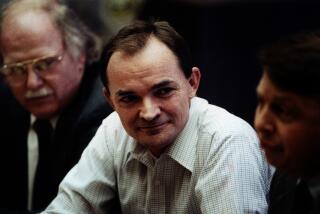Kraft Defense Blames One Murder on Child Molester
- Share via
The defense in the trial of Randy Steven Kraft continued its efforts Tuesday to shift some of the blame to a convicted child molester who committed suicide shortly after Kraft’s arrest.
Until now, the judge has kept out most of the evidence involving the child molester, based on arguments from the prosecution that there is little, if any, evidence to connect him with the victims.
But on Tuesday, Superior Court Judge Donald A. McCartin said he would reluctantly allow testimony about the child molester. The defense wants to link the molester with several of the murders of Marines that Kraft is charged with.
“In the abundance of caution,” McCartin said he would allow the defense to introduce evidence he considered “pretty far afield.” The judge also expressed concern about the slow pace of the case being put on by the defense for the last 4 weeks.
Comment on Slowness
“With the progress we’re making here, the jury is going to get disenchanted, I don’t know with whom,” McCartin said. The judge added that he worried whether the slowness would cause jurors to have a problem grasping all the evidence before them.
Kraft, 43, is on trial in Santa Ana charged with 16 murders in Orange County. If he is convicted, prosecutors might introduce evidence at a penalty phase that Kraft committed as many as 45 murders in Southern California, Oregon and Michigan.
Six of the 16 young men Kraft is charged with killing were Marines. Prosecutors have told the jury they believe that all 16 victims were either hitchhikers or were offered a ride by Kraft. Most of the victims’ bodies showed signs of sexual abuse.
The defense is blaming the death of one of those Marines, Donnie Lee Crisel, on John McMillan, the convicted child molester who killed himself in 1983--just 5 days after Kraft’s arrest.
Lived Near Base
McMillan lived near the Tustin Marine Corps Helicopter Air Station and at one time was a potential suspect in the June 16, 1979, death of Crisel, who was stationed at the El Toro Marine Corps Air Station but had visited friends at the Tustin base the night he was killed.
The judge has kept out most of the evidence involving McMillan, based on arguments from Deputy Dist. Atty. Bryan F. Brown that none of it should be admissible. Brown argued that there was no connection between McMillan and the Crisel death other than that McMillan had once been placed under surveillance during the investigation of the murders, and a Marine reported that McMillan once took him home and wanted to have sex with him.
“I don’t think it’s relevant,” Brown told the judge at a hearing outside the jury’s presence. “What you have here is conduct of a homosexual out trying to get consensual sex . . . you don’t have anything.”
But defense attorney D. Thomas McDonald countered: “I think the relevancy is overwhelming. . . . Reasonable doubt should be afforded to us in whatever form we can present it to this jury to consider.” McDonald told the court that the defense may try to link McMillan to several other of the Marine deaths.
Brown also lambasted McDonald for what he considered insinuations by the defense that investigators for the district attorney were discouraging some witnesses from testifying.
‘Bent Over Backwards’
“Judge, we have bent over backwards to help these guys (the defense) and the court continually allows them to go at this snail’s pace; it’s ridiculous,” Brown said.
The defense was granted a delay of nearly two months after Brown closed his case when McDonald told the court that he and co-counsel James G. Merwin were having trouble scheduling witnesses. Since Kraft attorneys began their case on Jan. 30, they have had trouble lining up enough witnesses to keep the trial going for full court days.
McDonald explained that the problem was primarily in lining up witnesses. But also, he argued, he cannot always anticipate when the judge’s rulings against him will interrupt his witness plans.
In other evidence Tuesday, a tire design expert who worked for the Firestone Co. for 28 years testified that a tire print on Crisel’s shorts, where the victim had been run over, did not come from Kraft’s car. However, law enforcement officials are not contending that it was Kraft’s car that left the mark. Crisel’s body was partially on the Irvine Center Drive on-ramp to the San Diego Freeway when found.
More to Read
Sign up for Essential California
The most important California stories and recommendations in your inbox every morning.
You may occasionally receive promotional content from the Los Angeles Times.













